


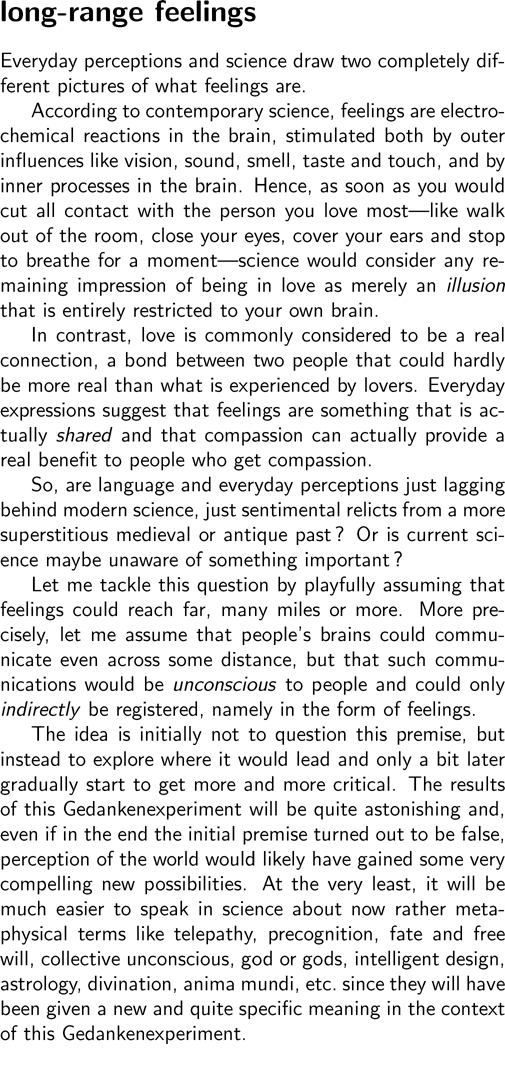

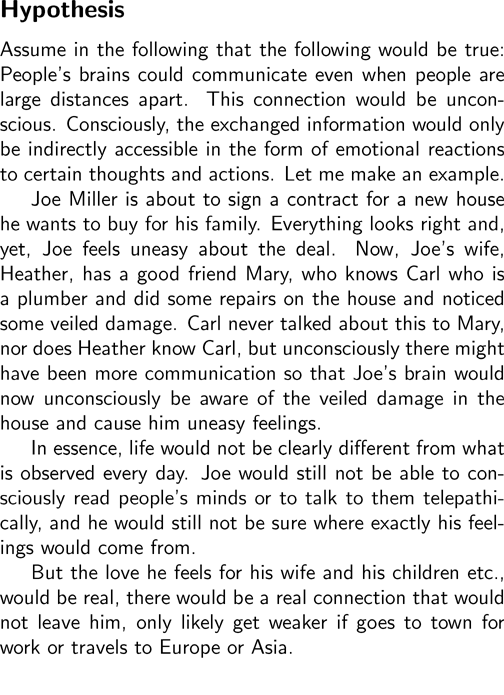
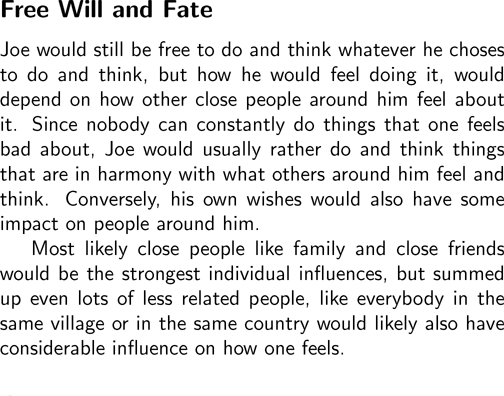
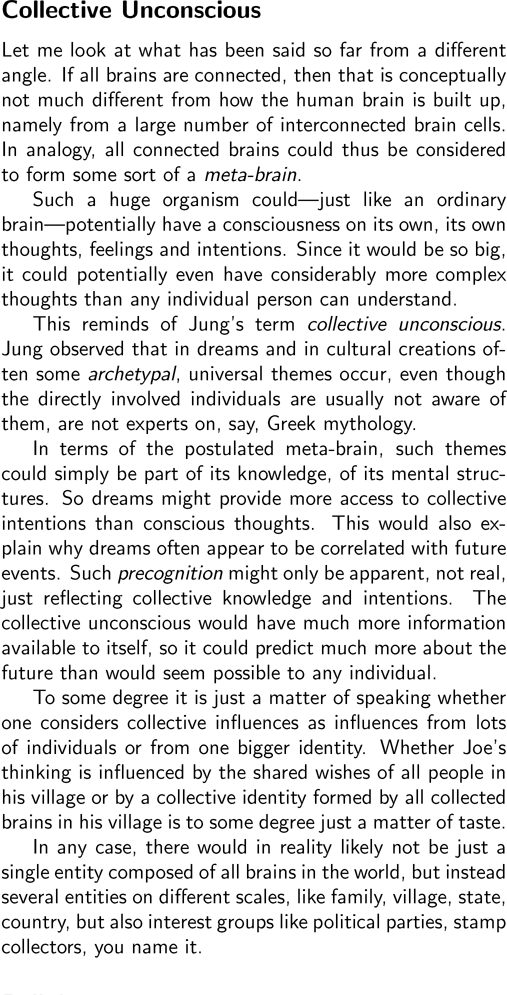
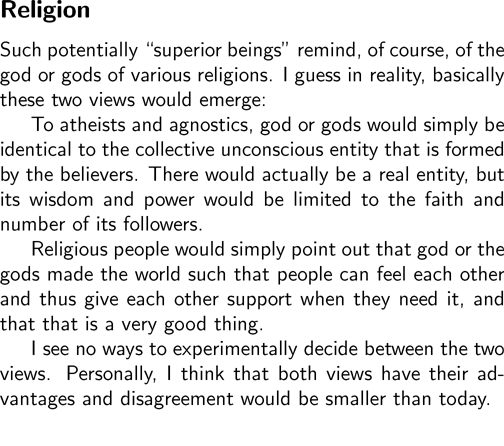
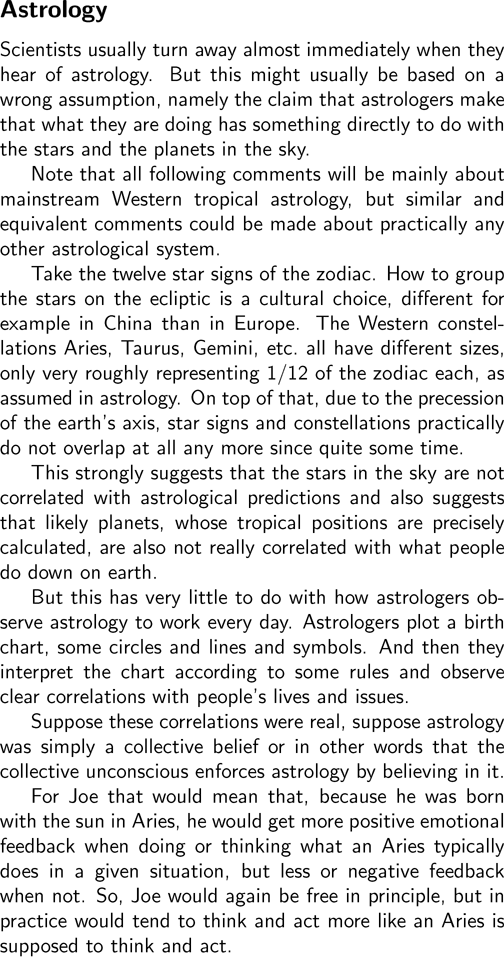
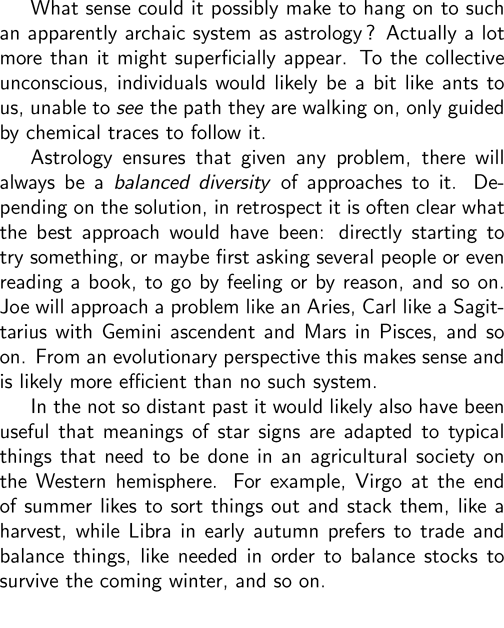
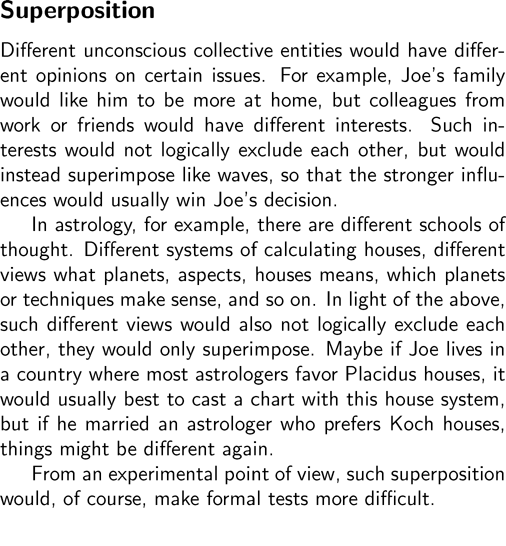
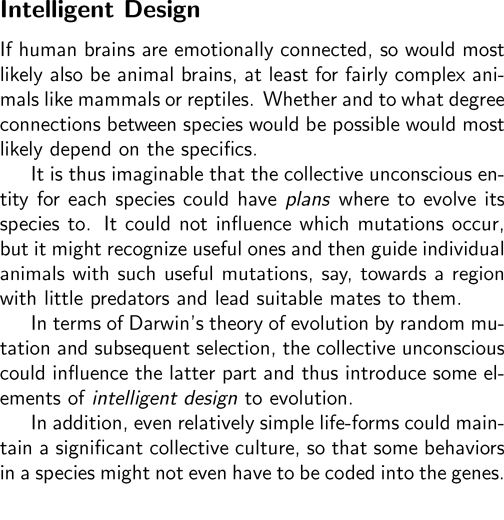
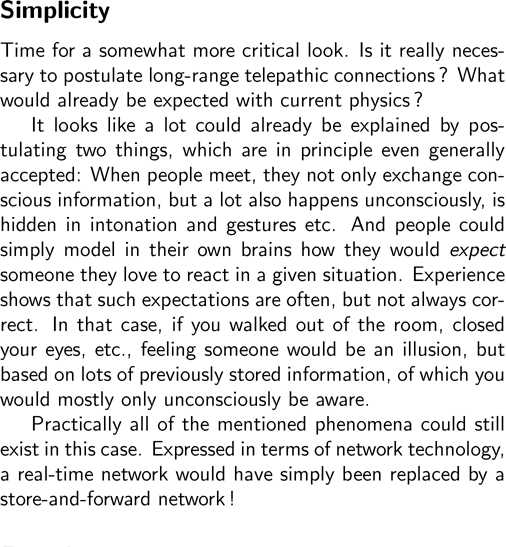
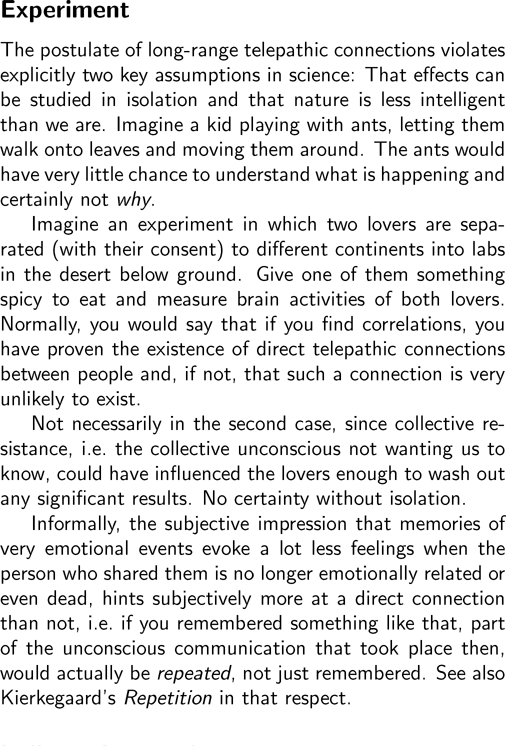
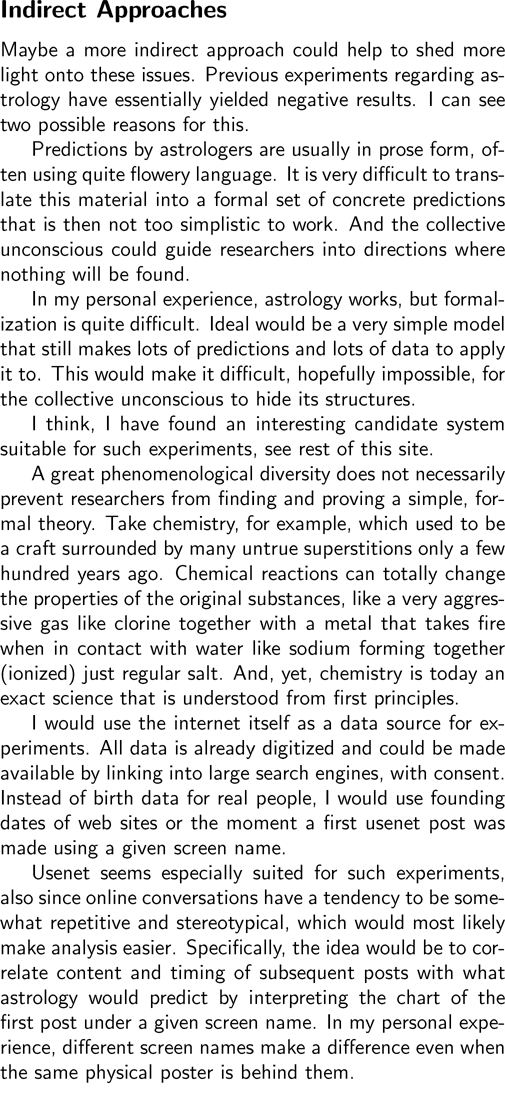
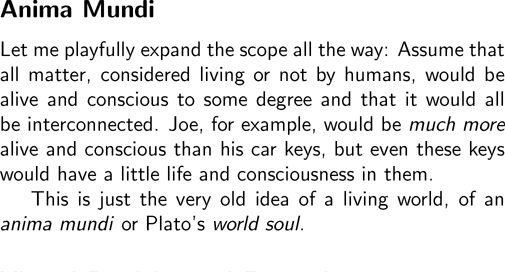
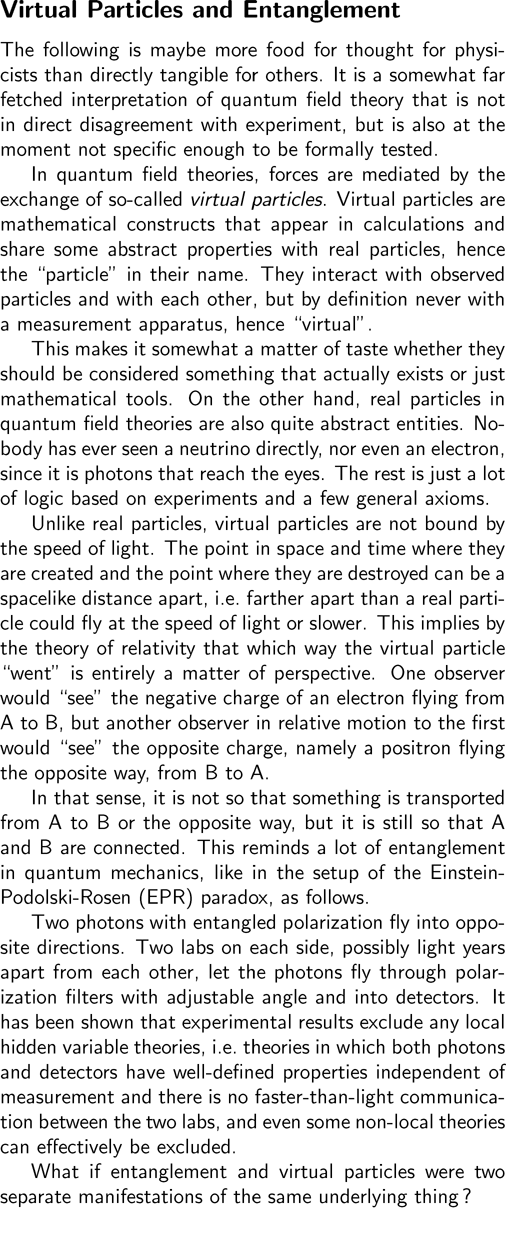
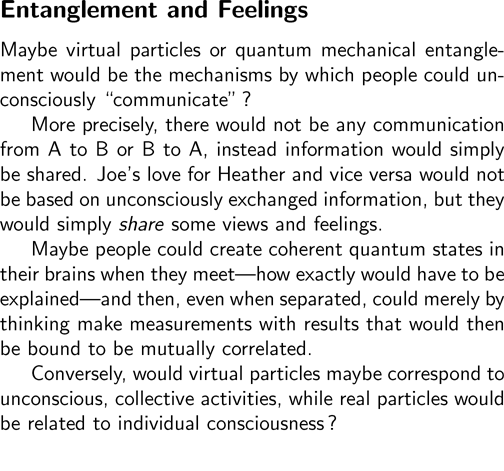

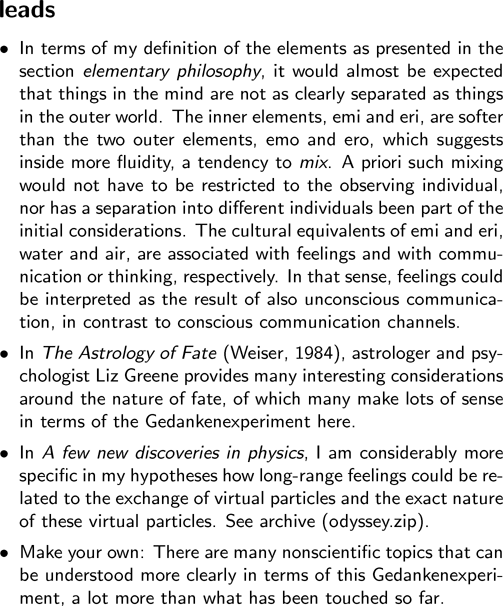



|
|

|
                    |
|
|
long-range feelingsEveryday perceptions and science draw two completely different pictures of what feelings are. According to contemporary science, feelings are electrochemical reactions in the brain, stimulated both by outer influences like vision, sound, smell, taste and touch, and by inner processes in the brain. Hence, as soon as you would cut all contact with the person you love most - like walk out of the room, close your eyes, cover your ears and stop to breathe for a moment - science would consider any remaining impression of being in love as merely an illusion that is entirely restricted to your own brain. In contrast, love is commonly considered to be a real connection, a bond between two people that could hardly be more real than what is experienced by lovers. Everyday expressions suggest that feelings are something that is actually shared and that compassion can actually provide a real benefit to people who get compassion. So, are language and everyday perceptions just lagging behind modern science, just sentimental relicts from a more superstitious medieval or antique past ? Or is current science maybe unaware of something important ? Let me tackle this question by playfully assuming that feelings could reach far, many miles or more. More precisely, let me assume that people's brains could communicate even across some distance, but that such communications would be unconscious to people and could only indirectly be registered, namely in the form of feelings. The idea is initially not to question this premise, but instead to explore where it would lead and only a bit later gradually start to get more and more critical. The results of this Gedankenexperiment will be quite astonishing and, even if in the end the initial premise turned out to be false, perception of the world would likely have gained some very compelling new possibilities. At the very least, it will be much easier to speak in science about now rather metaphysical terms like telepathy, precognition, fate and free will, collective unconscious, god or gods, intelligent design, astrology, divination, anima mundi, etc. since they will have been given a new and quite specific meaning in the context of this Gedankenexperiment. HypothesisAssume in the following that the following would be true: People's brains could communicate even when people are large distances apart. This connection would be unconscious. Consciously, the exchanged information would only be indirectly accessible in the form of emotional reactions to certain thoughts and actions. Let me make an example. Joe Miller is about to sign a contract for a new house he wants to buy for his family. Everything looks right and, yet, Joe feels uneasy about the deal. Now, Joe's wife, Heather, has a good friend Mary, who knows Carl who is a plumber and did some repairs on the house and noticed some veiled damage. Carl never talked about this to Mary, nor does Heather know Carl, but unconsciously there might have been more communication so that Joe's brain would now unconsciously be aware of the veiled damage in the house and cause him uneasy feelings. In essence, life would not be clearly different from what is observed every day. Joe would still not be able to consciously read people's minds or to talk to them telepathically, and he would still not be sure where exactly his feelings would come from. But the love he feels for his wife and his children etc., would be real, there would be a real connection that would not leave him, only likely get weaker if goes to town for work or travels to Europe or Asia. Free Will and FateJoe would still be free to do and think whatever he choses to do and think, but how he would feel doing it, would depend on how other close people around him feel about it. Since nobody can constantly do things that one feels bad about, Joe would usually rather do and think things that are in harmony with what others around him feel and think. Conversely, his own wishes would also have some impact on people around him. Most likely close people like family and close friends would be the strongest individual influences, but summed up even lots of less related people, like everybody in the same village or in the same country would likely also have considerable influence on how one feels. Collective UnconsciousLet me look at what has been said so far from a different angle. If all brains are connected, then that is conceptually not much different from how the human brain is built up, namely from a large number of interconnected brain cells. In analogy, all connected brains could thus be considered to form some sort of a meta-brain. Such a huge organism could - just like an ordinary brain - potentially have a consciousness on its own, its own thoughts, feelings and intentions. Since it would be so big, it could potentially even have considerably more complex thoughts than any individual person can understand. This reminds of Jung's term collective unconscious. Jung observed that in dreams and in cultural creations often some archetypal, universal themes occur, even though the directly involved individuals are usually not aware of them, are not experts on, say, Greek mythology. In terms of the postulated meta-brain, such themes could simply be part of its knowledge, of its mental structures. So dreams might provide more access to collective intentions than conscious thoughts. This would also explain why dreams often appear to be correlated with future events. Such precognition might only be apparent, not real, just reflecting collective knowledge and intentions. The collective unconscious would have much more information available to itself, so it could predict much more about the future than would seem possible to any individual. To some degree it is just a matter of speaking whether one considers collective influences as influences from lots of individuals or from one bigger identity. Whether Joe's thinking is influenced by the shared wishes of all people in his village or by a collective identity formed by all collected brains in his village is to some degree just a matter of taste. In any case, there would in reality likely not be just a single entity composed of all brains in the world, but instead several entities on different scales, like family, village, state, country, but also interest groups like political parties, stamp collectors, you name it. ReligionSuch potentially "superior beings" remind, of course, of the god or gods of various religions. I guess in reality, basically these two views would emerge: To atheists and agnostics, god or gods would simply be identical to the collective unconscious entity that is formed by the believers. There would actually be a real entity, but its wisdom and power would be limited to the faith and number of its followers. Religious people would simply point out that god or the gods made the world such that people can feel each other and thus give each other support when they need it, and that that is a very good thing. I see no ways to experimentally decide between the two views. Personally, I think that both views have their advantages and disagreement would be smaller than today. AstrologyScientists usually turn away almost immediately when they hear of astrology. But this might usually be based on a wrong assumption, namely the claim that astrologers make that what they are doing has something directly to do with the stars and the planets in the sky. Note that all following comments will be mainly about mainstream Western tropical astrology, but similar and equivalent comments could be made about practically any other astrological system. Take the twelve star signs of the zodiac. How to group the stars on the ecliptic is a cultural choice, different for example in China than in Europe. The Western constellations Aries, Taurus, Gemini, etc. all have different sizes, only very roughly representing 1/12 of the zodiac each, as assumed in astrology. On top of that, due to the precession of the earth's axis, star signs and constellations practically do not overlap at all any more since quite some time. This strongly suggests that the stars in the sky are not correlated with astrological predictions and also suggests that likely planets, whose tropical positions are precisely calculated, are also not really correlated with what people do down on earth. But this has very little to do with how astrologers observe astrology to work every day. Astrologers plot a birth chart, some circles and lines and symbols. And then they interpret the chart according to some rules and observe clear correlations with people's lives and issues. Suppose these correlations were real, suppose astrology was simply a collective belief or in other words that the collective unconscious enforces astrology by believing in it. For Joe that would mean that, because he was born with the sun in Aries, he would get more positive emotional feedback when doing or thinking what an Aries typically does in a given situation, but less or negative feedback when not. So, Joe would again be free in principle, but in practice would tend to think and act more like an Aries is supposed to think and act. What sense could it possibly make to hang on to such an apparently archaic system as astrology ? Actually a lot more than it might superficially appear. To the collective unconscious, individuals would likely be a bit like ants to us, unable to see the path they are walking on, only guided by chemical traces to follow it. Astrology ensures that given any problem, there will always be a balanced diversity of approaches to it. Depending on the solution, in retrospect it is often clear what the best approach would have been: directly starting to try something, or maybe first asking several people or even reading a book, to go by feeling or by reason, and so on. Joe will approach a problem like an Aries, Carl like a Sagittarius with Gemini ascendent and Mars in Pisces, and so on. From an evolutionary perspective this makes sense and is likely more efficient than no such system. In the not so distant past it would likely also have been useful that meanings of star signs are adapted to typical things that need to be done in an agricultural society on the Western hemisphere. For example, Virgo at the end of summer likes to sort things out and stack them, like a harvest, while Libra in early autumn prefers to trade and balance things, like needed in order to balance stocks to survive the coming winter, and so on. SuperpositionDifferent unconscious collective entities would have different opinions on certain issues. For example, Joe's family would like him to be more at home, but colleagues from work or friends would have different interests. Such interests would not logically exclude each other, but would instead superimpose like waves, so that the stronger influences would usually win Joe's decision. In astrology, for example, there are different schools of thought. Different systems of calculating houses, different views what planets, aspects, houses means, which planets or techniques make sense, and so on. In light of the above, such different views would also not logically exclude each other, they would only superimpose. Maybe if Joe lives in a country where most astrologers favor Placidus houses, it would usually best to cast a chart with this house system, but if he married an astrologer who prefers Koch houses, things might be different again. From an experimental point of view, such superposition would, of course, make formal tests more difficult. Intelligent DesignIf human brains are emotionally connected, so would most likely also be animal brains, at least for fairly complex animals like mammals or reptiles. Whether and to what degree connections between species would be possible would most likely depend on the specifics. It is thus imaginable that the collective unconscious entity for each species could have plans where to evolve its species to. It could not influence which mutations occur, but it might recognize useful ones and then guide individual animals with such useful mutations, say, towards a region with little predators and lead suitable mates to them. In terms of Darwin's theory of evolution by random mutation and subsequent selection, the collective unconscious could influence the latter part and thus introduce some elements of intelligent design to evolution. In addition, even relatively simple life-forms could maintain a significant collective culture, so that some behaviors in a species might not even have to be coded into the genes. SimplicityTime for a somewhat more critical look. Is it really necessary to postulate long-range telepathic connections ? What would already be expected with current physics ? It looks like a lot could already be explained by postulating two things, which are in principle even generally accepted: When people meet, they not only exchange conscious information, but a lot also happens unconsciously, is hidden in intonation and gestures etc. And people could simply model in their own brains how they would expect someone they love to react in a given situation. Experience shows that such expectations are often, but not always correct. In that case, if you walked out of the room, closed your eyes, etc., feeling someone would be an illusion, but based on lots of previously stored information, of which you would mostly only unconsciously be aware. Practically all of the mentioned phenomena could still exist in this case. Expressed in terms of network technology, a real-time network would have simply been replaced by a store-and-forward network ! ExperimentThe postulate of long-range telepathic connections violates explicitly two key assumptions in science: That effects can be studied in isolation and that nature is less intelligent than we are. Imagine a kid playing with ants, letting them walk onto leaves and moving them around. The ants would have very little chance to understand what is happening and certainly not why. Imagine an experiment in which two lovers are separated (with their consent) to different continents into labs in the desert below ground. Give one of them something spicy to eat and measure brain activities of both lovers. Normally, you would say that if you find correlations, you have proven the existence of direct telepathic connections between people and, if not, that such a connection is very unlikely to exist. Not necessarily in the second case, since collective resistance, i.e. the collective unconscious not wanting us to know, could have influenced the lovers enough to wash out any significant results. No certainty without isolation. Informally, the subjective impression that memories of very emotional events evoke a lot less feelings when the person who shared them is no longer emotionally related or even dead, hints subjectively more at a direct connection than not, i.e. if you remembered something like that, part of the unconscious communication that took place then, would actually be repeated, not just remembered. See also Kierkegaard's Repetition in that respect. Indirect ApproachesMaybe a more indirect approach could help to shed more light onto these issues. Previous experiments regarding astrology have essentially yielded negative results. I can see two possible reasons for this. Predictions by astrologers are usually in prose form, often using quite flowery language. It is very difficult to translate this material into a formal set of concrete predictions that is then not too simplistic to work. And the collective unconscious could guide researchers into directions where nothing will be found. In my personal experience, astrology works, but formalization is quite difficult. Ideal would be a very simple model that still makes lots of predictions and lots of data to apply it to. This would make it difficult, hopefully impossible, for the collective unconscious to hide its structures. I think, I have found an interesting candidate system suitable for such experiments, see rest of this site. A great phenomenological diversity does not necessarily prevent researchers from finding and proving a simple, formal theory. Take chemistry, for example, which used to be a craft surrounded by many untrue superstitions only a few hundred years ago. Chemical reactions can totally change the properties of the original substances, like a very aggressive gas like clorine together with a metal that takes fire when in contact with water like sodium forming together (ionized) just regular salt. And, yet, chemistry is today an exact science that is understood from first principles. I would use the internet itself as a data source for experiments. All data is already digitized and could be made available by linking into large search engines, with consent. Instead of birth data for real people, I would use founding dates of web sites or the moment a first usenet post was made using a given screen name. Usenet seems especially suited for such experiments, also since online conversations have a tendency to be somewhat repetitive and stereotypical, which would most likely make analysis easier. Specifically, the idea would be to correlate content and timing of subsequent posts with what astrology would predict by interpreting the chart of the first post under a given screen name. In my personal experience, different screen names make a difference even when the same physical poster is behind them. Anima MundiLet me playfully expand the scope all the way: Assume that all matter, considered living or not by humans, would be alive and conscious to some degree and that it would all be interconnected. Joe, for example, would be much more alive and conscious than his car keys, but even these keys would have a little life and consciousness in them. This is just the very old idea of a living world, of an anima mundi or Plato's world soul. Virtual Particles and EntanglementThe following is maybe more food for thought for physicists than directly tangible for others. It is a somewhat far fetched interpretation of quantum field theory that is not in direct disagreement with experiment, but is also at the moment not specific enough to be formally tested. In quantum field theories, forces are mediated by the exchange of so-called virtual particles. Virtual particles are mathematical constructs that appear in calculations and share some abstract properties with real particles, hence the "particle" in their name. They interact with observed particles and with each other, but by definition never with a measurement apparatus, hence "virtual". This makes it somewhat a matter of taste whether they should be considered something that actually exists or just mathematical tools. On the other hand, real particles in quantum field theories are also quite abstract entities. Nobody has ever seen a neutrino directly, nor even an electron, since it is photons that reach the eyes. The rest is just a lot of logic based on experiments and a few general axioms. Unlike real particles, virtual particles are not bound by the speed of light. The point in space and time where they are created and the point where they are destroyed can be a spacelike distance apart, i.e. farther apart than a real particle could fly at the speed of light or slower. This implies by the theory of relativity that which way the virtual particle "went" is entirely a matter of perspective. One observer would "see" the negative charge of an electron flying from A to B, but another observer in relative motion to the first would "see" the opposite charge, namely a positron flying the opposite way, from B to A. In that sense, it is not so that something is transported from A to B or the opposite way, but it is still so that A and B are connected. This reminds a lot of entanglement in quantum mechanics, like in the setup of the Einstein-Podolski-Rosen (EPR) paradox, as follows. Two photons with entangled polarization fly into opposite directions. Two labs on each side, possibly light years apart from each other, let the photons fly through polarization filters with adjustable angle and into detectors. It has been shown that experimental results exclude any local hidden variable theories, i.e. theories in which both photons and detectors have well-defined properties independent of measurement and there is no faster-than-light communication between the two labs, and even some non-local theories can effectively be excluded. What if entanglement and virtual particles were two separate manifestations of the same underlying thing ? Entanglement and FeelingsMaybe virtual particles or quantum mechanical entanglement would be the mechanisms by which people could unconsciously "communicate" ? More precisely, there would not be any communication from A to B or B to A, instead information would simply be shared. Joe's love for Heather and vice versa would not be based on unconsciously exchanged information, but they would simply share some views and feelings. Maybe people could create coherent quantum states in their brains when they meet - how exactly would have to be explained - and then, even when separated, could merely by thinking make measurements with results that would then be bound to be mutually correlated. Conversely, would virtual particles maybe correspond to unconscious, collective activities, while real particles would be related to individual consciousness ? leads
|